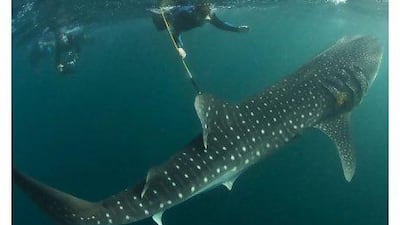DIBBA // The hunt for a whale shark began two hours before sunrise. After two gruelling days scouring the seas of the Musandam Peninsula from dawn till dusk, the men resigned themselves to a sharkless encounter.
It was no bloodthirsty hunt. David Robinson, a Dubai-based marine biologist, joined a crew of scientists from Oman's Sultan Qaboos University hoping to pin a satellite tag on a whale shark for his PhD research with Heriot-Watt University, which is based in Scotland and has a campus in Dubai.
A satellite tag is a device attached to the animal by marine biologists that pops off after a few weeks or months, floats to the surface and transmits data, such as temperature and distance, by satellite.
Mr Robinson is head scientist for Sharkwatch Arabia, a project that aims to satellite tag 25 whale sharks over the next five years.
This was the first attempt to tag a wild whale shark in the Gulf, where their habits remain a mystery.
"There are certainly whale shark movements but nobody knows anything in terms of numbers, or where they're moving, whether we've got juveniles or adults, or males or females," said Mr Robinson, 34, from England.
"There's lots of tagging been done elsewhere in the world but this area has really been missed so far."
The public can help too: Mr Robinson's research will draw on sightings by divers who upload images of whale sharks they have photographed to sharkwatcharabia.com.
Thanks to such entries this year and last, he has registered 52 encounters, including 36 in the past five month alone.
The photographs are run through a computer programme designed by Nasa to look at the stars. It has been adapted to measure the distances between the spots on the side of the whale sharks, which identifies them.
Using this technology, Mr Robinson has identified 23 whale sharks in four months.
Earlier this week, scientists spent two days surveying, snorkelling and diving in the hopes of tagging earlier this week, an important next step.
"At all other known aggregation sites the whale sharks are majority juvenile male with very few females being seen. This male majority at some sites can be as high as 84 per cent," Mr Robinson said.
"What we really don't know is where the females are," said Mr Robinson. "Nobody knows where they give birth. Really, there have only been a few babies caught.
"Preliminary tagging from Gujarat in India shows that there are some females there," he said, and there is speculation that this region might have a harem or two.
Mr Robinson has identified the sex of five whale sharks, and three of them are female.
Repeat sightings of identified whale sharks are rare.
"In all the sites what we know is that the whale sharks pass through but they don't come back. So where are they going? Nobody knows."
Being thick-skinned creatures - their skin is up to 14 cm thick - they are not bothered by the tag.
Le Méridien Al Aqah Beach Resort in Fujairah and the Emirates Diving Association have sponsored the first two tags at a cost of Dh15,000 a shot. Given that the whale sharks swim thousands of kilometres, any information could also be important for research projects in India, the Seychelles and the Maldives.
The first whale shark tagged and tracked in the Gulf, a juvenile female released from the Atlantis hotel in Dubai, travelled 348 kilometres west to Qatar in 33 days.
Sharkwatch Arabia is run in collaboration with Shark Quest Arabia and the Emirates Diving Association. Whale shark sightings are a major attraction for divers and are frequent in Musandam from May to September.
"We run specific trips to go and see them," said Simon Tambling, the managing partner of Al Boom Diving, who provided boats for the tagging. "If we've got customers we will go and look every day at the locations that we know. When people see it they are over the moon.
"You jump out your skin. It will swim past you and you will get about five seconds of seeing it and then it's gone."
The whale shark is a protected species in the UAE but does not enjoy the same security in other Gulf states.
"We're at a stage in this region where the decision makers themselves don't have that information so it's hard for them to make educated decisions on how to face these issues," said Jonathan Ali Khan, the project leader of Shark Quest Arabia.
"It's all new and emerging data that in time will be something decision makers can use," he said of the tagging project. "This isn't going to change things overnight but what it will do is get everybody thinking about it. The whale shark will become an ambassador of marine conservation."

